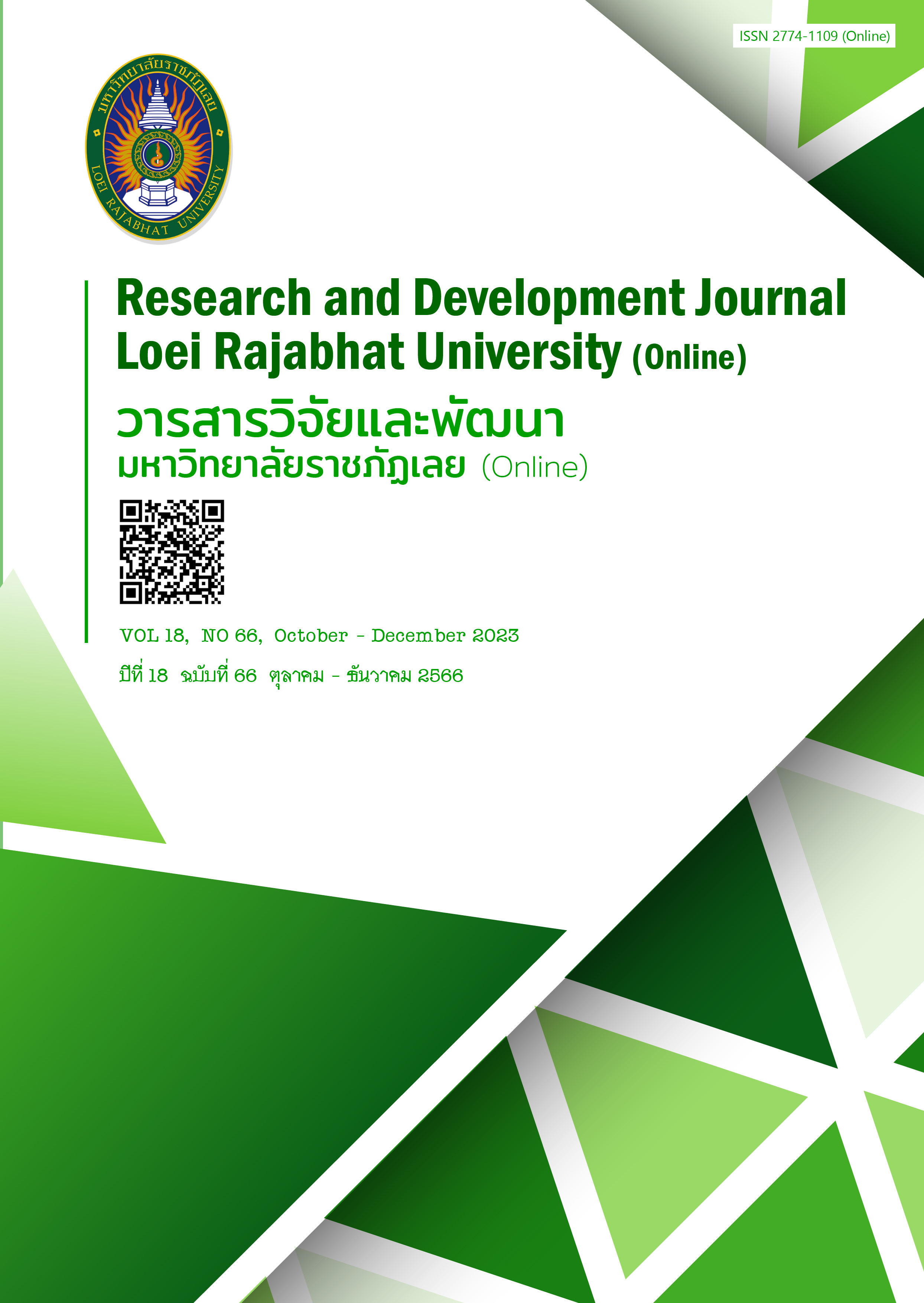The Value Creation for Adaptation of Hospitality and Tourism Industry of Thailand
Keywords:
value creation, adaptation, hospitality and tourismAbstract
The objectives of this research aimed to 1) study the context of the strengths, value creation, and impressions of the service industry and tourism in Thailand.; 2) propose to the application of value creation in the service industry and tourism in Thailand. It is qualitative research using the content analysis methodology. Data was collected through in-depth interviews and focus group discussions. The key respondents are a group of lecturer of Tourism, hotel and event management, public and private agencies, totaling 14 people. The study's findings revealed that: 1) presenting the strengths of authentic Thai that is in the roots of the nation's culture to make a difference in activities, locations and service providers to create word-of-mouth and impress tourists; and 2) creating value by using soft power for tourists through local tourism resources Including taking into account the sustainability of the environment in business operations and applying the information technology to disseminate information and facilitate travel.
References
กมลมาลย์ แจ้งล้อม และ ปุญญภพ ตันติปิฎก. (2565, ธันวาคม 21). เจาะ 13 สายนักท่องเที่ยวไทยที่ผู้ประกอบการควรรู้ ปรับกลยุทธ์ไม่ตกเทรนด์. สืบค้นจาก https://www.thairath.co.th/business/feature/2536573?fbclid=IwAR0z1ou7IIEe8mhhDAnmgcu6GAVZ71HKTswa-VBgo5VGnk23m1b9o9d0-U4.
กฤติเดช อนันต์. (2561). แนวทางการสร้างความจงรักภักดีต่อการท่องเที่ยวเชิงอาหารของประเทศไทยผ่านคุณค่าเชิงประสบการณ์ (วิทยานิพนธ์ปริญญามหาบัณฑิต). สถาบันพัฒนบริหารศาสตร์, กรุงเทพฯ.
จิตพนธ์ ชุมเกตุ, พิทักษ์ ศิริวงศ์ และ ธีระวัฒน์ จันทึก. (2560). การรับรู้และพัฒนาการจัดการ ตามแนวทางผู้ประกอบการทางสังคม ของวิสาหกิจชุมชนในภูมิภาคตะวันตกของประเทศไทย. วารสารการเมือง การบริหาร และกฎหมาย, 8(2), 292-322.
ฐิติยา เนตรวงษ์ และ ปริศนา มั่นเภา. (2564). การประยุกต์ใช้เทคโนโลยีดิจิทัลรองรับท่องเที่ยวเชิงสุขภาพสําหรับผู้สูงอายุวิถีปกติใหม่ จากสถานการณ์โควิด-19. วารสารนวัตกรรมวิทยาศาสตร์เพื่อการพัฒนาอย่างยั่งยืน, 3(1), 104-117.
ภัทร์ธมนต์ พลรงค์ และ ประสพชัย พสุนนท์. (2565). องค์ประกอบการมีส่วนร่วมเทศกาลสีเขียวของนักวิ่งมาราธอนในจังหวัดภูเก็ต. วารสารครุศาสตร์วิชาการ มหาวิทยาลัยราชภัฏเชียงราย, 7(2), 201-220.
ภาวินีย์ ธนาอนวัช. (2563). โรงแรมสีเขียว: กลยุทธ์การบริหารจัดการและการปฏิบัติบัญชีเพื่อการจัดการ สิ่งแวดล้อมของโรงแรมกรุงศรีริเวอร์ จังหวัดพระนครศรีอยุธยา. วารสารการบัญชีและการจัดการ มหาวิทยาลัยมหาสารคาม, 12(2), 117-134.
ระชานนท์ ทวีผล. (2562). แนวทางการจัดการอัตลักษณ์โฮมสเตย์ไทย จังหวัดเพชรบุรี และจังหวัดประจวบคีรีขันธ์. วารสารวิจัยและพัฒนา มหาวิทยาลัยราชภัฏเลย, 14(48), 22-33.
วิจัยกรุงศรี. (2565, 3 กันยายน). แนวโน้มธุรกิจ/อุตสาหกรรม ปี 2562-2564: ธุรกิจโรงแรม. สืบค้นจาก https://www.krungsri.com/th/research/industry/industry-outlook/Services/Hotels/IO/Io-hotel-21
สํานักงานส่งเสริมการจัดประชุมและนิทรรศการ (องค์การมหาชน). (2565, 11 พฤศจิกายน). Virtual Event. สืบค้นจาก https://innocatalog.tceb.or.th/th/innovation-service/product/1039
Ahani, A., Nilashi, M., Ibrahim, O., Sanzogni, L., and Weaven, S. (2019). Market segmentation and travel choice prediction in Spa hotels through TripAdvisor’s online reviews. International Journal of Hospitality Management, 80, 52-77.
Ben Lahouel, B., and Montargot, N. (2020). Children as customers in luxury hotels What are Parisian hotel managers doing to create a memorable experience for children?. International Journal of Contemporary Hospitality Management, 32(5), 1813-1835.
EHL Insights. (2022, September 11). Top Hospitality Industry Trends. Retrieved from https://hospitalityinsights.ehl.edu/hospitality-industry-trends.
Fu, Y. K., and Wang, Y. J. (2020). Experiential value influences authentic happiness and behavioral intention: Lessons from Taiwan’s tourism accommodation sector. Tourism Review, 76(1), 289-303.
Goleman, D., and Davidson, R., (2017). Altered Traits: Science Reveals How Meditation Changes Your Mind, Brain, and Body. New York: Avery Books.
Guillet, B. D., and Shi, X. (2019). Can revenue management be integrated with customer Relationship management?. International Journal of Contemporary Hospitality Management, 31, 978–997.
Horng, J. S., Liu, C. H., Chou, S. F., Yu, T. Y., and Hu, D. C. (2022). Marketing Management in the Hotel Industry: A Systematic Literature Review by Using Text Mining. Sustainability, 14(4), 2344.
Kandampully, J., Bilgihan, A., and Amer, S. M. (2022). Linking servicescape and experience scape: creating a collective focus for the service industry. Journal of Service Management, 2022. doi.org/10.1108/JOSM-08-2021-0301.
Kavaratzis, M., and Hatch, M. J. (2013). The dynamics of place brands: An identity-based approach to place branding theory. Marketing theory, 13(1), 69-86.
Ketter, E. (2018). It’s all about you: destination marketing campaigns in the experience economy era. Tourism Review, 73(3), 331-343.
Kim, W. H., Cho, J. L., and Kim, K. S. (2019). The relationships of wine promotion, customer satisfaction, and behavioral intention: The moderating roles of customers' gender and age. Journal of Hospitality and Tourism Management, 39, 212-218.
Li, Z., Wang, D., Abbas, J., Hassan, S., and Mubeen, R. (2022). Tourists’ health risk threats amid COVID-19 era: role of technology innovation, Transformation, and recovery implications for sustainable tourism. Frontiers in Psychology, 12, (2022), 769175. doi.org/10.3389/fpsyg.20 21.769175.
Miles, M., and Huberman, A. (1994). Qualitative Data Analysis. California: SAGE Publications.
Mody, M. A., Suess, C., and Lehto, X. (2017). The accommodation experiencescape: a comparative assessment of hotels and Airbnb. International Journal of Contemporary Hospitality Management, 29(9), 2377-2404.
Salem, I. E., Elbaz, A. M., Al-Alawi, A., Alkathiri, N. A., and Rashwan, K. A. (2022). Investigating the Role of Green Hotel Sustainable Strategies to Improve Customer Cognitive and Affective Image: Evidence from PLS-SEM and fsQCA. Sustainability, 14(6), 3545.
SiteMinder. (2022, September 11). Hotel industry trends to watch out for this year. Retrieved from https://www.siteminder.com/r/hotel-trends-hotel-hospitality-industry/#hotel-industry-market-trends.
Tasci, A. D., and Milman, A. (2019). Exploring experiential consumption dimensions in the theme park context. Current Issues in Tourism, 22(7), 853-876.
Thurmond, A. V. (2001). The Point of Triangulation. Journal of Nursing Scholarship, 33(3), 253-258.
UNESCO. (2022, December 20). COVID-19 Educational Disruption and Response. Retrieved from https://en.unesco.org/themes/education-emergencies/coronavirus-school-closures.
ผู้ให้สัมภาษณ์
ศุภวรรณ ตีระรัตน์. (2565, 29 ตุลาคม). รองผู้อำนวยการสำนักงานส่งเสริมการจัดประชุมและนิทรรศการ (องค์การมหาชน). [สัมภาษณ์]
ศิริปกรณ์ เชี่ยวสมุท. (2565, 29 ตุลาคม). รองผู้ว่าการการท่องเที่ยวแห่งประเทศไทย (ททท.) ด้านตลาดยุโรป แอฟริกา ตะวันออกกลาง และอเมริกา. [สัมภาษณ์]
สุขพงส์สักก์ ลิขิตพิทยากร. (2565, 29 ตุลาคม). ผู้อำนวยการฝ่ายฝึกอบรม AHS Training Services บริษัท Absolute Hotel Services ผู้ดูแลจัดการธุรกิจโรงแรมในเครือ U Hotel and Resort และ Eastin. [สัมภาษณ์]
Downloads
Published
How to Cite
Issue
Section
License
Copyright (c) 2023 Research and Development Journal, Loei Rajabhat University

This work is licensed under a Creative Commons Attribution-NonCommercial-NoDerivatives 4.0 International License.
ข้อความที่ปรากฎในวารสารฉบับนี้เป็นความคิดเห็นของผู้เขียนแต่ละท่าน สถาบันวิจัยและพัฒนา มหาวิทยาลัยราชภัฏเลย และกองบรรณาธิการ ไม่จำเป็นต้องเห็นด้วยและไม่มีส่วนรับผิดชอบใดๆ
สถาบันวิจัยและพัฒนา มหาวิทยาลัยราชภัฏเลย ขอให้ผู้อ่านอ้างอิงในกรณีที่ท่านคัดลอกเนื้อหาบทความในวารสารฉบับนี้






